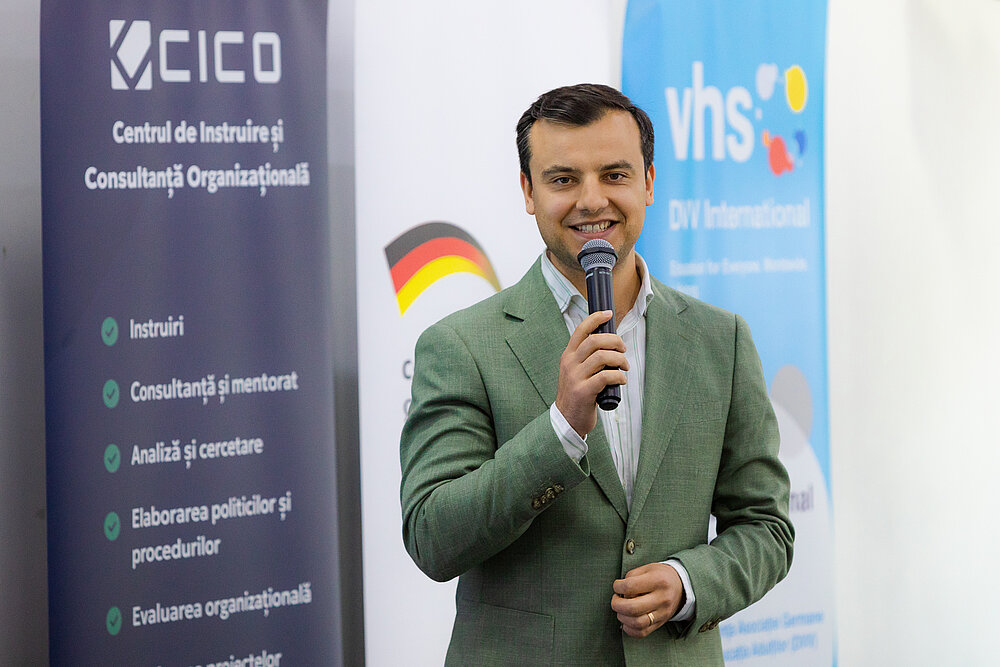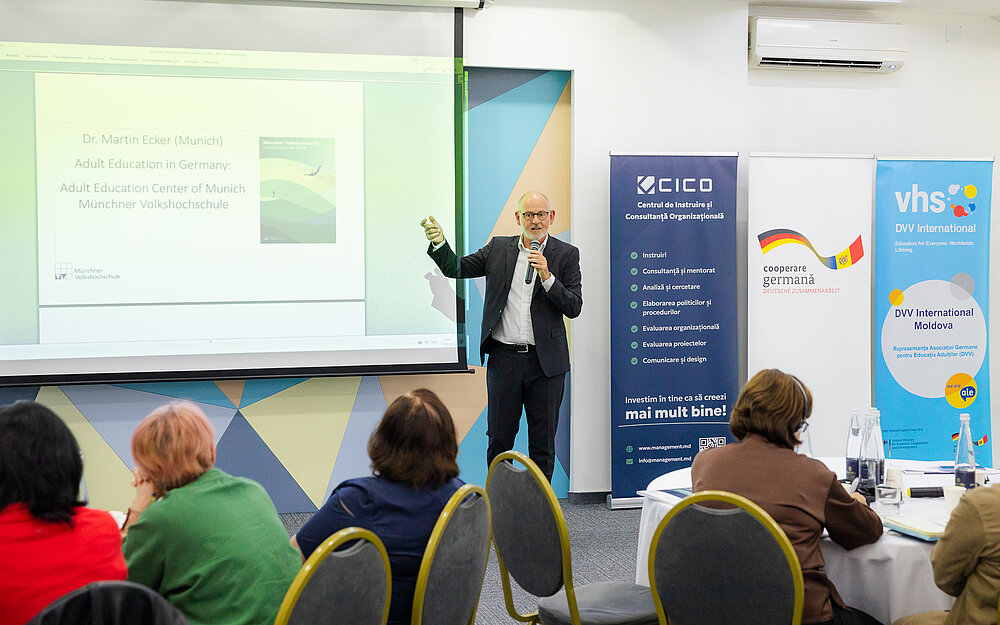On 12 June 2025, DVV International Moldova, in partnership with Center for Organizational Consultancy and Training (CICO), organised a workshop within the ALE Platform members with the topic “Adult Learning and Education in Moldova: From vision to implementation”.
The purpose of the workshop was to facilitate dialogue and collaboration in the field of adult learning and education (ALE) among key stakeholders from the public sector, civil society, and academia. This was achieved by analysing current challenges and opportunities and showcasing good practices and relevant international experiences.
The event brought together 41 representatives from public institutions, academic bodies, and civil society organizations.
The event agenda combined plenary sessions, thematic presentations, interactive workshops, and collaborative reflections to create a balanced learning environment for all participants.
Opening speeches were delivered by Lilia Buimestru (Senior Consultant, Lifelong Learning Service, Ministry of Education and Research of Moldova), Adela Scutaru-Guțu (Country Director, DVV International Moldova), and Nicolai Loghin (General Director, Center for Organizational Consultancy and Training (CICO)). They emphasized the strategic importance of ALE in public policy, the value of cross-sectoral collaboration in promoting ALE, and the significance of implementing ALE vision framework in close partnership with civil society organizations.
Levan Kvatchadze, Regional Director for “Eastern Neighbours”, DVV International, shared an insightful overview of the key definitions and concepts of ALE, as well as international policy frameworks on adult education, drawing attention to global trends.
This was followed by keynote speech from Dr. Martin Ecker, Director of Management at VHS Munich. He presented an in-depth overview of the German model for adult education, focusing on its structure, governance, and operational dynamics. He paid special attention to the role of sustained public financing and community relevance in building resilient adult learning institutions.
The event continued with two discussion sessions, which were facilitated by Nicolai Loghin (CICO General Director) and Mariana Iațco (PhD in Political Science, University Lecturer, and Advocacy Expert). The first workshop was dedicated to Strengthening the ALE Ecosystem – Multisectoral Collaboration between CSOs, Government, and Academia. This session employed structured group discussions and brainstorming. As a result, the participants defined the challenges of the ALE Platform and provided recommendations for improvement. The lack of a consolidated intersectoral collaboration framework for the ALE Platform was recognized as a major barrier to the effective development of the ALE ecosystem in Moldova.
The next discussion session, led by Mariana Iațco, featured the “Compass of Change” exercise — a participatory reflection tool designed to help participants analyze and understand the challenges and opportunities associated with life transitions. The discussion focused on “Learning for Life Transitions – The Role of Adult Learning and Education (ALE) in Empowering Adults During Periods of Change.” Participants were divided into three thematic sub-groups, each exploring a specific dimension of adult life transitions: (1) Career and Education, (2) Community Engagement and Civic Participation, (3) Financial and Entrepreneurial Transitions. DVV International carefully documented the results for future analysis and to inform the next steps in raising awareness and developing programmes to support ALE in Moldova. Participants also reflected on their own professional journeys and the role of ALE in supporting them, deepening their understanding of the importance of adult learning and education for all.
The event concluded with an overview of the ways in which the ALE Platform and its members can contribute to policy improvement in adult learning and education in Moldova. Some of the most important of these are:
Promote regular dialogue and exchange between civil society actors, service providers, and decision-makers at the central government level, including the Ministry of Education and other line ministries.
Promote ALE through public events, regional training sessions and community-level awareness activities, aiming to build bottom-up demand and support.
Conduct studies on existing ALE services delivered by both the state and civil society organizations to identify gaps and formulate evidence-based improvement proposals.
Provide methodological support to public institutions to help them adjust and improve normative frameworks related to adult education.
Consider creating a formal body or association under the Platform to serve as an advocacy hub and policy voice for the ALE sector.
Create and maintain a multidisciplinary ALE community drawing on expertise in education, employment, health, social inclusion, and rural development.
Promote peer learning and the presentation of best practices to showcase how adult learning contributes to personal development and community resilience.
The main recommendations for the Platform are as follows:
To establish a clearly defined governance model and coordination mechanism for the Platform.
To align event planning in concordance with the operational calendars of key stakeholders to improve engagement and reduce drop-off risks.
To strengthen the three pillars of governance, visibility and inclusiveness. This implies establishing a transparent and legitimate Platform governance structure; maintaining an active public presence through the media, communication campaigns, and outreach; and ensuring broader participation — particularly from rural actors, informal learning providers, and underrepresented sectors.
This event was organized within the Platform for Adult Learning and Education, which is financially supported by the German Federal Ministry for Economic Cooperation and Development (BMZ).






